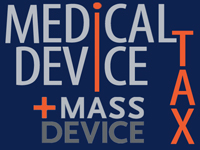
White House senior advisors are prepared to stamp out medical device tax repeal efforts should a House bill make it all the way the President’s desk, according to Capitol Hill bulletin released less than a day before the House’s vote on the measure.
Repeal efforts undermine the spirit of the Affordable Care Act, which gave rise to the tax, and would allow the med-tech industry to benefit from the extended patient population added by healthcare reform without paying its fair share, according to a letter from the White House Office of Management & Budget.
Rep. Erik Paulsen’s H.R. 436, which will hit the House floor for a vote later today, has widespread support in the chamber with 240 bill co-sponsors at last tally. Proponents of repeal, including device makers, industry lobbyists and a slew of the Minnesota Republican’s GOP colleagues, have argued that the tax threatens jobs, innovation, patient access to life-saving healthcare and the U.S.’s lead in the med-tech world.
"The Affordable Care Act made significant improvements to the nation’s healthcare system that are helping to improve individuals’ health and give American families and small business owners more control of their own healthcare," according to the White House press release. "H.R. 436, which would repeal the medical device excise tax, does not advance these goals."
"If the President were presented with H.R. 436, his senior advisors would recommend that he veto the bill," the letter concluded.
The threat puts a damper on today’s House session for Paulsen, who’s expecting to log a victory once his bill hits the full chamber floor for a vote.
Although the bill has plenty of GOP support and will likely pass the House without a fuss, actual repeal is likely a non-starter in the Senate, where not a single Democrat has signed Sen. Orrin Hatch’s (R-Utah) companion bill.
"H.R. 436 would fund tax breaks for industry by raising taxes on middle-class and low-income families," according to the OMB letter. "Instead of working together to reduce healthcare costs, H.R. 436 chooses to refight old political battles over healthcare."
Financial firm Morgan Stanley painted a grim future for repeal, writing in a recent note that, although the likelihood of repeal has grown, the device tax likely won’t go down this year.
"We believe the law has a strong chance of passing in the House, but are very skeptical of its chances in the Senate and do not expect the repeal to be enacted before 2013," analysts wrote. "Even if the repeal of the medical device tax fails, which we see as the most likely scenario, the possibility to remove or lessen the tax is not over."
The medical device excise tax, set to take effect in January 2013, would take 2.3% of every medical device sale in the U.S., raising about $30 billion over 10 years to help pay for measures contained in healthcare reform.
"The medical device industry, like others, will benefit from an additional 30 million potential consumers who will gain health coverage under the Affordable Care Act starting in 2014," according to the White House bulletin. "This excise tax is one of several designed so that industries that gain from the coverage expansion will help offset the cost of that expansion."
Finding a way to make up for the lost revenue was a big concern for Democrats questioning the merit of repealing the measure during the House Ways & Means Committee meeting last week.
In response, GOP leaders unveiled a measure intended to take a stronger hand in recouping overpaid health insurance tax credits granted to low- and middle-income families. The measure could raise as much as $43.9 billion over 10 years, but White House advisors aren’t enthused.
"This tax break, as well as other provisions in the legislation relating to tax-favored health spending arrangements, would be funded by increased repayments of the Affordable Care Act’s advance premium tax credits, which would raise taxes on middle-class and low-income families, in many cases totaling thousands of dollars, notwithstanding that they followed the rules," the OMB wrote. "This legislation would also increase the number of uninsured Americans."

